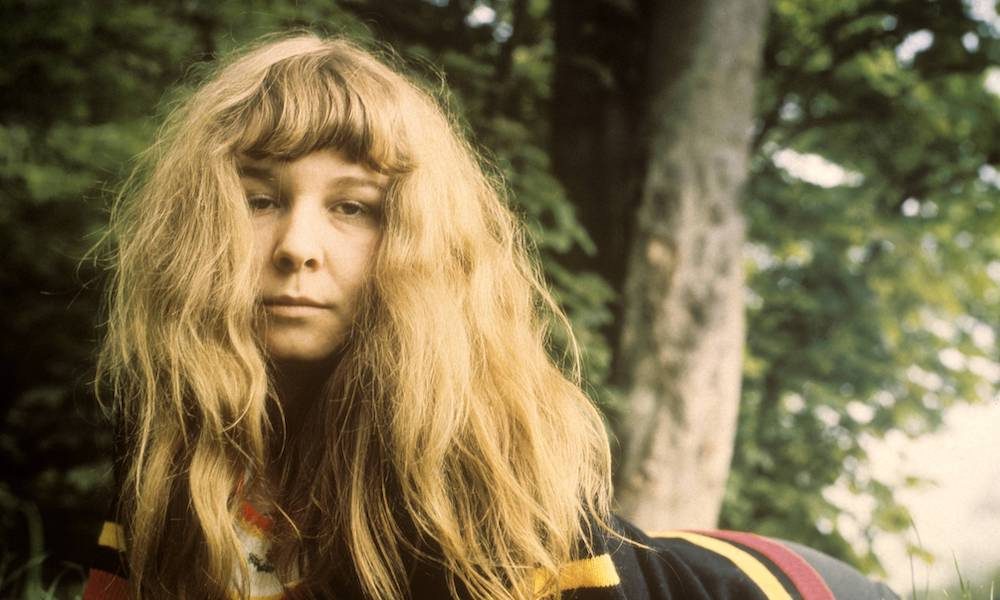Not Like Other Folk: The Delicate Artistry Of Sandy Denny
Denny was one of Britain’s finest vocal talents, and the aura around her has only enhanced since her passing.

Any story about Sandy Denny has an element of sadness, for a life cut short at 31. But it seems much more fitting to celebrate what she achieved, and the music she left with us.
The recording output of Alexandra Denny, born in Merton Park in south London, was sadly limited to four solo albums. But when you consider both that catalog and her work with Fairport Convention, the short-lived Fotheringay, her early endeavors with the formative Strawbs and more, there’s no room for doubt that she was one of Britain’s finest vocal talents. The aura around her has only enhanced since her passing.
Denny’s recordings with a pre-record deal Strawbs — her early career plans to be a nurse by now on hold — were not issued at the time, but came out in the mid-1970s. Sandy had sung solo, including at London’s famed Troubadour club (one of the real nerve centres of the folk scene from the 1960s onwards), even before she joined the Strawbs. Her first appearance on record was with some solo material on Scottish folk singer Alex Campbell’s 1967 album Alex Campbell and Friends, and there was also work with British musician Johnny Silvo.
It was during that short period with the Strawbs that Denny wrote and first recorded the song that became, for many, her melancholy signature, “Who Knows Where The Time Goes.” She auditioned for Fairport as a replacement for Judy Dyble, joining the ranks in time for their second album What We Did On Our Holidays, released early in 1969. It showed her abilities both as a vocal interpreter and an original songwriter, notably on the track “Fotheringay” which started the LP.
“It just so happened that I bumped into them, and it developed into quite a long relationship,” Denny said of the Fairport relationship in the NME in 1972. “But I think I must have acquired an awful lot more musical ideas from them than I might have done from any other group. Their influences are so mixed.”
Recording schedules being what they were in those days, the next Fairport album Unhalfbricking was released just six months later, for which she wrote “Autopsy”; led the band through a remake of her “Who Knows Where The Time Goes”; and joined them for an appearance on Top Of The Pops singing their near-Top 20, French language version of Bob Dylan’s “If You Gotta Go, Go Now,’ titled ‘Si Tu Dois Partir.”
There was a third Fairport album of 1969, Liege & Lief, in December, a sequence made all the more remarkable by the fact that these are considered to be among the crown jewels of the long-running band’s mighty oeuvre. Denny had a songwriting credit, with Ashley Hutchings, on “Come All Ye,” but the album was themed around remakes and updates of traditional material – and she was gone from the line-up even before it was released, departing on November 22.
Fotheringay, the band she then formed with her husband-to-be Trevor Lucas, was intended as a vehicle for her to drive herself, as it were. Their live work included a show at the Royal Albert Hall in the autumn of 1970, supported by the up-and-coming Elton John, but they lasted only one, self-titled album.
That led Denny, finally, to her first album under her own name, the mystical and revered The North Star Grassman and the Ravens. Now, she was in almost full writing control, as she was on the equally admired Sandy in 1972.
For all the acclaim, the albums didn’t make the hoped-for commercial impact. North Star was her only UK LP chart entry during her lifetime, and that for only two weeks and a No.31 peak. The reaction to 1974’s Like An Old Fashioned Waltz was further diluted by the fact that Denny had rejoined Fairport, briefly, by the time of its release.
The reunion lasted less than two years, and a return to solo work with the 1977 album Rendezvous did not reverse her fortunes. Hampered by alcohol and substance abuse, Denny grew more troubled, and died a few weeks after a fall while on holiday in Cornwall. The years since her death have enhanced the appreciation for Sandy Denny’s rare skills as a songwriter, performer and artist of rare songwriting craft.
Listen to the best of Sandy Denny on Spotify,
“I can’t tell you about my songs,” she said in that NME interview of 1972. “They’re so strange. They’re about people. I don’t know why they are – they just come out like that. I do try to write a bit more cheerfully, but it doesn’t always come off.”
Buy or stream Sandy Denny’s No More Sad Refrains: The Anthology.













Dean Morrissey
June 9, 2015 at 3:06 am
To me she was a beacon of hope. When i hear her voice it pulls me into 16th century English landscapes. Especially the Fairport years. I need to get familiar with her solo work. She left a beautiful legacy especially for one who died so young.
Peter
September 11, 2015 at 3:00 am
I AWAYS FIND HER VOICE BREATHTAKING
Des McClelland
November 22, 2017 at 9:15 pm
Nearly 40 years after her passing and, in my opinion, no one else even comes close.
Jonas
January 4, 2018 at 8:27 pm
That’s so true, Des.
VITUS J KONTER
November 22, 2017 at 11:32 pm
Loved her early work with The Strawbs and also her killer duet with Robert Plant on Zep IV’s “The Battle of Evermore”.